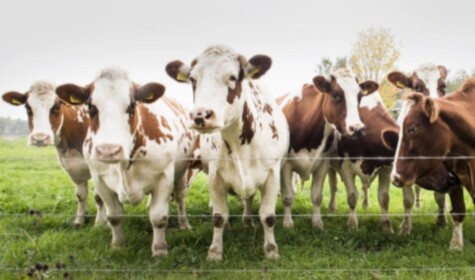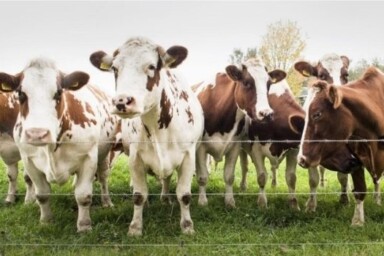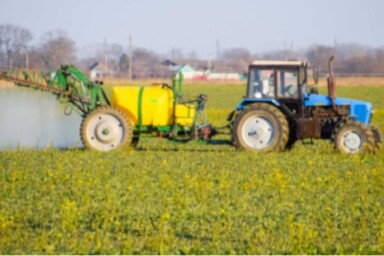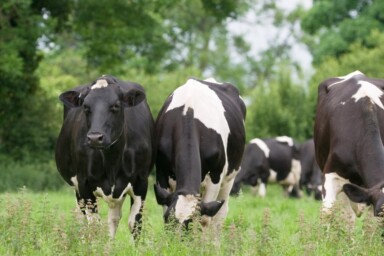The Sustainable Food Trust (SFT) takes issue with a recent study undertaken in Germany and cited in an article by Damien Carrington in the Guardian newspaper under the headline ‘Organic meat production just as bad for climate, study finds’.
The Guardian’s headline should be treated with caution in the UK, at least. A recent UK study, actually cited by the German researchers, provides clear evidence that organic beef, lamb, pork and dairy products in England and Wales have significantly lower carbon footprints than intensively produced equivalents. The German study concludes that only organic pork and dairy had lower emissions.
The UK data shows, for example, that the carbon footprint of a kilogram of organic beef protein is 8.85 kg smaller than the same quantity of conventionally-produced beef protein. Using the latest methodology for calculating the warming impact of greenhouse gases (as described below), each kilo of organic beef protein has an even smaller carbon footprint, 13.89 kg lower than conventional beef.
Recognising the true warming impact of methane
The latest methodology shows organic beef and lamb production in a more favourable light because it takes into account the short lifetime of methane in the atmosphere, as well as its relative warming ability. Most estimates still use GWP100, which attempts to calculate the relative impact of greenhouse gases over 100 years. However, as scientists from Oxford University have shown, this works well for CO2 and nitrous oxide, both of which persist in the atmosphere for a very long time (CO2 indefinitely), but it over-estimates the impact of constant methane emissions from a stable population of ruminants (as is the case in the EU) three-fold, because most of this has broken down within a decade.
Oxford University Professor Myles Allen, a leading IPCC author and a key scientist behind the need to move to net zero carbon, and colleagues have devised a new methodology they call GWP* which gives by far the most accurate indication of the actual warming impact of methane emissions. This shows that a herd of cattle which remains the same size over 20 years produces a constant level of warming, but it does not increase global warming in any significant way. This is because each day as much methane breaks down as is emitted. This is very much the case in the UK where ruminant numbers are currently stable and about 25% lower than in the 1980s. However, GWP* also shows that where methane emissions are increasing, as they are globally, the real impact of the extra methane is actually higher than it appears when calculated using GWP100.
Failure to account for soil carbon
The authors of the German study acknowledge, ‘That organic farming has lower soil-borne GHG emissions and higher rates of carbon sequestration in the soil’ and also that, ‘Soil degradation resulting from conventional systems would slow down or could even be reversed by changing to organic farming’. But while they include a calculation of CO2 emissions associated with land use change overseas, they do not appear to have taken into account soil carbon losses and sequestration within Germany. They have also overlooked the wider implication that in order to arrest and reverse soil degradation to safeguard the productivity of soils for future generations, there has to be a transition to regenerative farming systems, amongst which organic production is the most precisely defined. In addition, as in many similar studies, no account is taken of the historic soil carbon losses associated with all-arable farming systems, such as intensive horticulture. Most continuously cropped soils in the UK have lost more than 40% of their carbon over recent decades and that carbon is still in the atmosphere warming the planet, as much now as when it was lost from the soil.
Incomplete comparisons
A further point is that in comparing a kilogram of vegetables with a kilogram of meat in terms of carbon footprint, no account is taken of the actual amount of nutrients each contains. Taking this into account would considerably increase the carbon footprint of both plant-based diets and meat produced using a significant amount of grain, while reducing the relative footprint of beef and lamb predominantly raised on grass.
The researchers appear to be unaware that the benefits of organic production methods, some of which they recognise, are only possible because grazing livestock are used to build fertility on organic farms. This allows the use of forage legumes, such as clover, which naturally introduce large amounts of nitrogen fertility, without the land having to be taken out of food production, as on the small number of stockless organic horticultural holdings. They also appear to be unaware that significant areas of farmland in all countries are only suitable for growing grass and that if these are not grazed with livestock no food is produced on this land.
Perhaps most significantly, in concluding that plant-based diets are associated with the lowest levels of greenhouse gas emissions and that organic meat production is associated with the highest land use, the researchers overlook a detailed analysis which shows that ‘low cost livestock’ fed only on grass and arable by-products (a formula very close to that of organic production standards) can produce 9-23g of protein a day, and that including this meat in the diet requires 25% less arable land than vegan diets. Analysis by the SFT has concluded that 21.7g of protein per person per day are produced from grass in the UK, with an additional 3.97g from human inedible crop by-products fed to cattle and sheep.
The German study is an interesting contribution to the emerging field of true cost accounting in food systems, an area of considerable importance, as Sustainable Food Trust reports have shown. However, by monetising only the greenhouse gas emissions from agriculture (and that not comprehensively) while ignoring all other agricultural externalities, they create a distorted picture at many levels.
Robert Barbour provided additional research for this piece.






